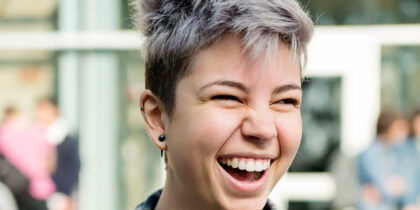Offering flexible support without the need for bureaucratic eligibility criteria can be an effective way to engage young people so that they get the right support for their mental health, a report by Centre for Mental Health has found today.
Someone to talk to is the result of an independent evaluation of an initiative from Centre 33, a young people’s charity in Cambridgeshire and Peterborough. The report explores the impact of providing more bespoke support to young people who may need more holistic, flexible intensive or longer-term help. This includes those who face barriers to support due to health inequalities and for example might be homeless or estranged from their families.
The report finds that the Someone To Talk To pilot service reached young people without the need for restrictive eligibility criteria. Young people and their engagement worker together chose whether to use that or Centre 33’s more structured regular offer. The young people who chose the Someone To Talk To pilot had a more significant and complex range of needs and health inequalities than those who didn’t.
The Someone To Talk To pilot offered young people more choice and control about the kind of support they received for their mental health, where they go for it and how often they attend. While waiting for talking therapy, Centre 33 checked in with young people through drop-in, phone calls and text, and after they finished they were able to stay in touch.
The young people who used the Someone To Talk To pilot benefited from greater and significant improvements to their mental health, with the biggest benefits felt by those that had more contact with Centre 33.
Someone to talk to concludes that mental health services for young people will work better if they are more flexible, with a more varied offer of support and with more choices for young people about what help they get, where and for how long.
Centre for Mental Health chief executive Dr Sarah Hughes said: “Young people with mental health difficulties are not ‘hard to reach’ as they are sometimes labelled. Too often, services don’t reach out or they’re not flexible enough. Centre 33’s Someone To Talk To initiative shows that with the right offer of support, young people are easy to reach, and they use services according to what they actually need.
“We need to look again at how mental health services work to ensure they don’t exclude young people whose lives are more complex and who need more bespoke support. Services should offer young people more choices about the support they get and how they want to access it. No one size fits all, and for young people it’s especially important that mental health support is compassionate, consistent and responsive to what’s going on in their lives.”
Deputy Chief Executive from Centre 33, Meg Platt said: “We have long known that involving young people in the design of their own support results in better engagement. This pilot has enabled us to back this up with evidence of the strong correlation between flexibility, engagement and better outcomes for young people’s mental health. It’s particularly strong in those facing health inequalities and it’s a huge piece of learning that we are very excited about.”



